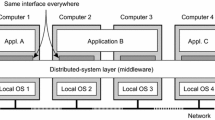Abstract
In this paper we show that decision making processes evolve to be more and more distributed and asynchronous. In order to support decision-makers who are not at the same place at the same time we define cooperation processes and a set of models models able to support designers of Cooperative decision support framework. These models come from a more general architecture of a Cooperative Knowledge Based System and are based on the knowledge acquisition field. A definition of cooperative decision support framework is also given.
Similar content being viewed by others
References
Aussenac-Gilles, N., D. Bourigault, A. Condamines, and C. Gros. (1995). “How Can Knowledge Acquisition benefit from Terminology ?” In Proceedings of the 9th Knowledge Acquisition Workshop, Univ. of Calgary, Canada, February.
Biebow, B. and S. Szulman. (1998). “A Terminological Approach to Categorize the Concepts of an Ontology,” In Proceedings of IC’98 (Ingénierie des Connaissances), Pont-à-Mousson (F), Nancy, laboratoire LORIA-INRIA, 51–58.
Carberry, S. (1989). “Plan Recognition in Understanding Dialog,” In User Models in Dialog Systems, A. Kobsa and W. Wahlster editors, Springer Verlag, 133–162.
Carberry, S. and L. Lambert. (1991). “A Tripartite Plan-Based Model of Dialogue,” In Proceedings of the 29th Annual Meeting of the ACL, 47–54.
De Vreede, G. J. and O. Briggs. (2005). “Collaboration Engineering: Designing Repeatable Processes for High-Value Collaborative Tasks,” In Proceedings of the 38th HICSS, 0-7695-2268-8/05 IEEE.
Eom, Sean B. (2002). “Extended Enterprise Decision Support Systems: A New Frontier in the Internet Age,” Proceedings of the IFIP TC8/WG8.3 Conference July 4–7, 726–739.
Forgionne, G., M. Mora, F. Cervantes, and O. Gelman. (2002) “I-DMSS: A Conceptual Architecture for the Next Generation of Decision Making Support Systems in the Internet Age,” Proceedings of the IFIP TC8/WG8.3 Conference July 4–7, 154–165.
Gachet, Alexandre (2002). “A New Vision for Distributed Decision Support Systems,” Proceedings of the IFIP TC8/WG8.3 Conference July 4–7, 341–352.
Grosz B., J., and S. Kraus. (1995). “Collaborative Plans for Complex Group Action,” Artificial Intelligence 86, 259–357.
Jessup L. and J. Valacich. (1993). Group Support Systems: New Perspectives. Macmillan, New York.
Keen, P. G. W. and M. S. Scott Morton. (1978). Decision Support Systems: An organisational perspective. AddisonWesley Publishing Company.
Matta, N. and N. Aussenac-Gilles. (1996). “Expliciter une méthode de résolution de problèmes avec MACAO: problèmes méthodologiques”, In Acquisition et ingénierie des connaissances: tendances actuelles, Cepadues Editions, Toulouse, 29–48.
Reynaud, C., N. Aussenac-Gilles, P. Tchounikine, and F. Trichet. (1997). “The Notion of Role in Conceptual Modelling,” In Proceedings of EKAW97 – European Knowledge Acquisition Workshop - R. Benjamins & E. Plaza (eds), Springer Verlag, Lecture Notes in Artificial Intelligence, Computer Science Editorial, Heidelberg, 221–236.
Schmidt, K. and L. Bannon. (1992). “Taking CSCW Seriously: Supporting Articulation Work,” Computer Supported Cooperative Work 1(1-2), 7–40.
Simon, H. A. (1977). The New Science of Management Decision. Prentice Hall.
Smoliar, S. W. and R. Sprague (2002). “Communication and Understanding for Decision Support,” Proceedings of the IFIP TC8/WG8.3 Conference July 4–7, 107–119.
Soubie, J. L. (1998). “Modelling in Cooperative Knowledge Based Systems,” In Third International Conference on the Design of Cooperative Systems COOP’98, Cannes, France. INRIA, 45–48.
Sprague, R. H. and E. D. Carlson. (1982). Building Effective Decision Support Systems. Prentice Hall, Inc., Englewood Cliffs.
Teulier, R. and P. Zaraté. (2001). “Vers une nouvelle problématique de l’aide à la decision utilisant les connaissances,” In Proceedings IC 2001, Plate Forme AFIA, 147–166.
Wielinga, B., W. Van de Velde, G. Schreiber, and H. Akkermans. (1992). “The CommonKADS Framework for Knowledge Modelling,” Report of ESPRIT KADS-II Project p. 5248: KADS-II/1.1/PP/UVA/35/1.0, September.
Zalaket, J. and G. Camilleri. (2004). “OAP: Object-Oriented Approach for Planning Modeling,” International Journal of Uncertainty, Fuzziness and Knowledge-Based Systems (IJUFKS), World Scientific Publishing Company, V. 12 N. Supp02, 63-82.
Author information
Authors and Affiliations
Corresponding author
Rights and permissions
About this article
Cite this article
Soubie, JL., ZaratÉ, P. Distributed Decision Making: A Proposal of Support Through Cooperative Systems. Group Decis Negot 14, 147–158 (2005). https://doi.org/10.1007/s10726-005-2404-y
Issue Date:
DOI: https://doi.org/10.1007/s10726-005-2404-y




